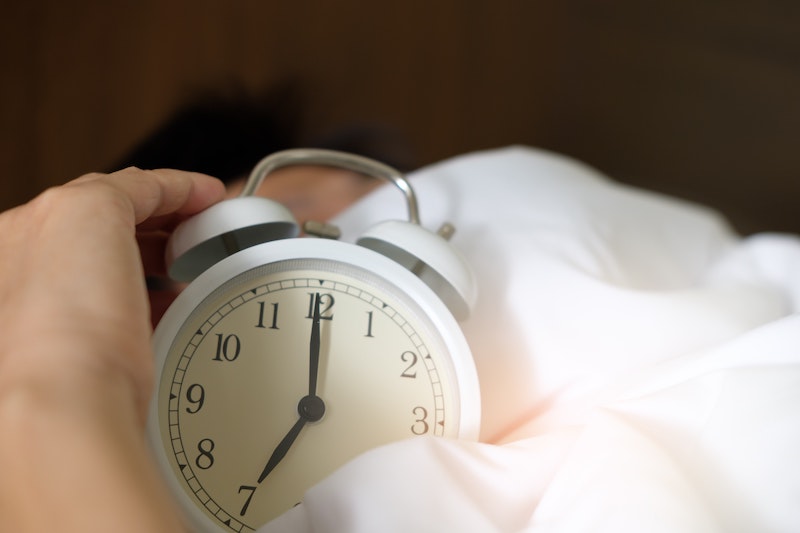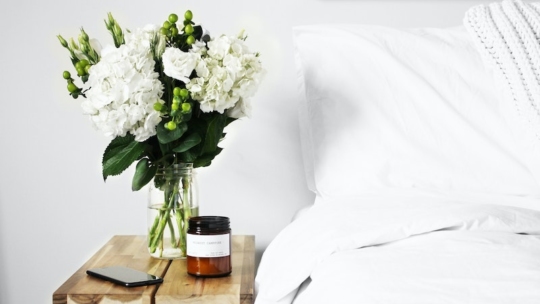There’s nothing like waking up and feeling refreshed. In this day and age, getting a full seven to nine hours of sleep isn’t always possible. This may be down to a busy lifestyle, work-related stresses or simply burning the candle at both ends as the saying goes.

You may be asking yourself, how do I fall asleep better?
Is it possible to train your body to sleep better?
In this article, we’ll be exploring the importance of a good night’s sleep and some top tips that can help improve your sleep quality.
The importance of a good night’s sleep
You don’t have to be an expert to know that a good night’s sleep can have a significant impact on your health as well as your mental state. Did you know that we’re the only mammals who willingly delay sleep?
Perhaps it’s because we can do a lot more in this lifetime and therefore, it may come down to a fear of missing out or running out of time.
The right sleep habits though can do wonders for your body. Sleep is helpful in repairing the body and re-energizing it for the following day. For your mind, it can help to switch off and relax. Sleep matters when it comes to your general wellbeing, so having the knowledge to improve it can certainly help.
10 tips to get more sleep
There are many different ways that you can better your sleep and to increase the hours of bedtime you get every night.
These ten tips should be a good starting point to improving your sleep at night.
1. Go to bed and wake up at the same time every day
Your internal clock is something to pay close attention to when it comes to getting a good night’s sleep. As humans, we like having a routine and that should be the same for your bedtime routine. However, not everyone sticks to the same times when it comes to going to bed and waking up the next day.
There may be personal preferences as to what time you want to go to bed but try to keep it around the same time. It’ll help you improve your sleep cycle by training your body into a routine.
2. Let in more natural light during the daytime
Known as your circadian rhythm, your natural body clock is impacted by natural sunlight or bright light during the day. It can help keep it healthy and will ensure quality sleep when nighttime comes around.
This is also why sunrise alarm clocks can be a helpful addition to start your mornings.
Poor sleep can often be related to the lack of natural daylight that a person gets and that severe sleep issues are often caused by this too.
If you’re not someone that gets to see a lot of natural light, then it’s worth investing in some bulbs and artificial light that mimics natural daylight.
3. Avoid blue light exposure and don’t use your phone before bed
Blue light is one of those that can have a negative impact on your sleep and according to sleep experts, it results in our brains being more wired and alert. It means that using your phone or watching television before bed, is likely going to keep you awake in bed for longer, making it harder to fall asleep.

Our tech habits as a human race are definitely unhealthy with 54% of children sleeping near their phones and 75% of people sleeping in a room that has a TV. Try to remove any blue light gadgets or devices at least an hour before bed.
4. Have a cut-off time for drinking caffeine
Caffeine provides you with energy and is useful during those hours of the day where you may be flagging. However, it’s important to have a cut-off point when drinking caffeine because if you’re going too late in the day, you may struggle to fall asleep.
When drinking caffeine you also want to be aware of how many cups you’re drinking each day, especially when it comes to your heart rate. Although there’s no official link to causing heart disease, it’s always wise to take caution over how many cups you’re consuming every day.
5. Try to reduce any daytime naps
A daytime nap can be counter-productive when trying to achieve better sleep. You may find it hard to achieve deep sleep if you’re disrupting your sleep cycle with short or long naps during the day.
It can be necessary to have a nap sometimes, perhaps after a night out or on those occasions where you’ve not slept properly. However, it’s something you want to limit as best as you can.
6. Increase your production of melatonin
Melatonin production is the hormone that can you sleep better. Darkness is what prompts this pineal gland to start producing melatonin, whereas light causes it to stop. With that in mind, if you’re subjecting yourself to too much like, especially blue light, it’s good to increase your melatonin levels.
One example of helping achieve this is by taking melatonin supplements. It can provide that extra boost that your body needs and where you may be lacking.
7. Improve your bedroom environment
Your sleep environment plays an important role when getting a good night’s sleep. It’s useful to look at how you could improve your bedroom environment through what you wear and how you set it up for the evening.
For example, you could get a sleep mask and consider what pajamas make you feel the most comfortable when in bed.
You may wish to invest in some blackout blinds or curtains to help keep the light out from outside. In the hours before bedtime, you may want to play some relaxation music or light a scented candle.
These small changes can make a big difference to how well you fall asleep and the quality of sleep you get.
8. Take a relaxing bath or shower
A relaxing bath or shower is a must when you’re wanting to get your body temperature to that point where it’s most relaxed. This can be an easy task to incorporate into your routine and it’s something that you can alternate throughout the week. Depending on your preference, you may prefer to have warm showers over a bath.
Sleep schedules will often include a warm and relaxing bath or shower before bed because it can help ease tired muscles and aches. That way, you’re not in pain or discomfort when lying in bed.
9. Address any sleep disorders
Lost sleep or lack of sleep might be due to underlying conditions that you’ve not yet ruled out.
It’s a good idea that if you’re suffering from sleep deprivation, it’s good to get professional advice so that certain sleep conditions like sleep apnea or teeth grinding can be dismissed.
The impact of sleep disorders can be severe and so it’s important to do what you can to address the issue, sooner rather than later. If you have concerns, see a sleep expert or your local doctor.
10. Invest in the right sleep products
Investing in the right sleep products can be helpful in improving sleep patterns. You may find that you are in need of some new pillows or a mattress for your bed. It’s important to keep an eye on how long you’ve had these sleep products as the average mattress should be replaced every eight years or so.
Even in the case of pillows lasting a long time, they can often build up a lot of bacteria and stain, especially if they don’t have removable and machine washable covers.
It’s good to get these replaced when needed as they can all contribute to a better night’s sleep.
Still Can’t Fall Asleep?
If you’re still having trouble falling asleep, then you may want to think about how you prepare yourself for bed and the routine you create for yourself.
Optimizing your sleep schedule
- Budget time for sleep by allocating it into your schedule. Don’t let other social events or work get in the way of your sleep.
- Make sure you sleep on a bed, rather than anything that’s going to cause you discomfort, like the couch for example.
- Adjust your schedule gradually so that your body can adapt and get used to any changes that may occur.
Foster the right habits during the day
By fostering the right habits during the day, you may end up finding that you fall asleep faster as a result. A few suggestions of good habits to implement into your daily routine are:
- Get plenty of natural sunlight throughout the day.
- Find time to move and exercise where possible.
- Be wary of alcohol and mindful over how late you eat.
Can you train your body to sleep better?
Of course, when you train your body with regular exercise, you get fitter and the same can be said for your nighttime routine. Training your body through regular patterns of sleep, so going to bed at the same time each evening will help.
You can try different tips as well as the ones mentioned above to see whether anything improves.
Looking after your physical health can help and other relaxation techniques could be useful to unwind after a long day.

